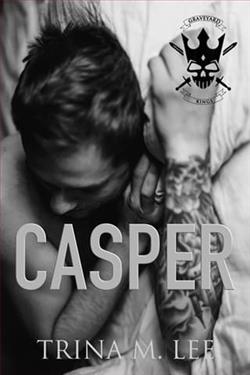Page 37 of Lessons in Faking
“Oh my God,” I groaned, head falling back. “I did not miss you,” I clarified. To myself and to him. “I have not been racking my brain about you, and I do not care why you canceled or what came up.”
McCarthy snorted, then went on without a care in the world. “Don’t worry, Princess. I wouldn’t dare cancel on you if it weren’t of the utmost importance.” His gaze leveled with mine, the nickname rolling off his tongue in a snicker.“Coach wanted to speak with us before class. About the upcoming Brown game.”
“I don’t care.”
“Right.” He underlined the cockiness in his voice with a wink. “By the way,” he added. “If you want me to spontaneously notify you about who might be in my office at which time and for what reason”—I went to interrupt him again, but McCarthy raised his voice playfully—“I should probably have your number.”
I gave in, stretching my arm across the desk for his phone. It only took a second before I held it in my hands, unlocked.
“Don’t sign me up for any weird spam with this,” I said, typing in my number begrudgingly.
“Or what?” Judging by the smug expression on his face when I handed him the phone back, he was enjoying this a little too much.
“Or I’ll have you killed.” My sweet smile didn’t match the icy, serious tone. McCarthy chuckled, actually chuckled, and it was kind of cute.
“I’d like to see you try, Pressley.”
*
“Pearson product-moment correlation?”
I wasn’t exaggerating when I said this was probably the hundredth time that phrase had come out of his mouth in one tutoring session. Thinking positively, which I’d been told to start doing often enough, I was pretty sure an hour ago I’d never heard of the term before. Progress, right?
Still, that didn’t help much when I was supposed to define it. With so many new words in my vocabulary, they were all scrambled and mixed together, forming one giant statistical mess in my head. The odds of getting the definition ofPearson product-moment correlationright were pretty slim.
I groaned. McCarthy had given up his seat on the opposite side of the desk, saying he needed to walk off his frustration. Fine by me. Until he’d decided to lean against my side of it for a more... intimidating approach.
His words, not mine.
Convincing him (and myself) that I had no problem being close to him, I positioned my chair right in front of him. It didn’t leave much space between my angled knees and his extended legs. I could catch a glimpse of his hopeful expression as I looked at the ceiling. How he still had any hope left after this, I didn’t understand. I had given up a long time ago. Still, I tried my best. I owed it to Mom, at the very least.
Pearson product-moment correlation.
It’s kind of like high school English class—memorizing terms and definitions. I’d been great at that. It had been the only subject where I hadn’t been standing in my parents’ shadow. Something I’d been better at. Better than Mom and her algorithm-equation brain, and perhaps even better than Henry, with his lack of creativity, which did not benefit him when it came to building mnemonic forms. Another thing I’d been great at. Only now, instead of definingcinquain poemsandsonnets, McCarthy was askingabout a certain type of correlation. Which meant some kind association between...
“Measures strength,” I began, wary. He nodded. “And direction of association between two variables?” I half-guessed, half... didn’t?
To my surprise, McCarthy’s face didn’t fall in disappointment this time. He didn’t roll his eyes or opt for a teasing comment before asking the same question again. Instead, he smiled. Widely. “That’s it! Well done.”
In some distant corner of my mind, I noted how good his praise felt. Like I’d accomplished something by making him proud. I couldn’t help the smile that took over my entire face until I noticed it was there and until I grasped that the reason for it washissmile. It dropped as soon as the realization did, and McCarthy mirrored me.
“We should probably end this on the only positive note we’re gonna get out of you today,” he suggested. The shift in attitude made me squirm in my seat, nose flaring at his sarcasm.
“Ha-ha.” I didn’t want to admit he was probably right. “Have a little more faith in me, McCarthy.” Perhaps the way to master (or at the very least, not fail) this class was to stop thinking about how great a statistician Mom had been, and consequently, how awful I was in comparison. Instead, focusing on what I’d been better at (e.g., memorizing) seemed like a step in the right direction.
McCarthy hummed low. “The problem isn’tmyfaith, Princess.”
There was that nickname again. The one that wasn’tsupposed to make my stomach flip and my lips twitch. It was an insult, after all. A dig at everything that screamed privilege about me. So I glared at him.
“You still think this is going to end well?” We’d been doing this for a while, and I was nowhere near a passable grade. Exams were fast approaching too.
McCarthy just shrugged. “Of course.” He said it so convincingly, he almost had me. “If you fail, it means I’ve failed,” he reminded me. “And I don’t do that.”
He was right, of course. If there was one thing bigger than my ego—which was clearly failing me at the moment—it was his. And when McCarthy said he wouldn’t fail, he wouldn’t.
My eyes lingered on him for a little while longer. His lips were parted slightly, a pretty pink and a little puffy, probably from gnawing on them whenever he’d waited for me to answer a question. His brown eyes roamed the room as if he didn’t spend hours in here every week. He made a point out of not looking at me, and I kind of enjoyed just watching him.
That snapped me out of it fast.















